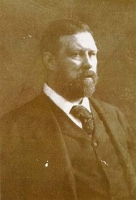| jíguàn: | dū bólín | ||
yuèdòubù lāi mǔ · sī tuō kè Bram Stokerzài小说之家dezuòpǐn!!! | |||
xǔ duō rén, shèn zhì zhěng gè xī fāng wén tán dū jiāng tā kàn zuò shì xī xuè guǐ děng kǒng bù tí cái de zhèng zōng shǐ zǔ, kě dāng wǒ men dì yī cì kàn dào 〈 dé kù lā 〉 de shí hòu, xiǎng bì ràng rén chù dòng zuì dà de shì qí zhōng rén yǔ xī xuè guǐ bēi shāng de 'ài qíng gù shì, xǔ duō wǎng yè shì zhè yàng jiè shào zhè gù shì de“ lā mǔ . shǐ tuō kè xiě de xiǎo shuō miàn shì yī bǎi nián yǐ lái, yǐ yòu wú shù diàn yǐng diàn shì bǎn běn, dàn jí shǎo zhōng yú yuán zhù, gē pǔ lā( bǐ zhě zhù: yòu yì zuò fú lǎng xī sī · fú tè · kē bō lā, zuì wéi rén suǒ shú zhī de zuò pǐn shì〈 jiào fù〉 hé〈 xiàn dài qǐ shì lù〉) jué dìng yào hái tā běn lái miàn mù。 dá gǔ lā bó jué yuán shì luó mǎ ní yà dàjiàng jūn, yīn wù chuán sǐ xùn 'ér lìng qíng rén zì shā, tā yǐ xī rén xuè yán xù shēng mìng, xiàng shàng dì bào fù。 sì bǎi nián hòu tā yù shàng yǔ qíng rén yī bān múyàng de shàonǚ, jué dìng yào bù xī dài jià duó huí suǒ 'ài。 běn piàn de yǎn chū zhèn róng kě wèi qiáng dà, chú liǎo nán nǚ zhùjué wài, gèng yòu jī nǔ lǐ wéi sī、 ān dōng ní . huò pǔ jīn sī、 lǐ chá dé .E. gé lán tè děng dà míng xīng chū rèn pèijué。” kě zhè yàng de jiǎn jiè jī běn shàng kě yǐ shuō shì cuò lòu bǎi chū, yòu xīn de dú zhě kě yǐ zhǎo yī zhǎo yuán shū yī dú。 diàn yǐng de bǎn běn( yī bān dū fān yì wéi〈 jīng qíng sì bǎi nián〉) hěn duō, shèn zhì kě yǐ shuō tài duō, suǒ yǐ gǎo hùn yě shì wú kě hòu fēi。
bù lāi mǔ sī tuō kè chū shēng yú 1847.11.8, dé guó dū bólín rén, zài tā 'èr shí duō suì shí dāng shàng liǎo gōng wù yuán, kě zhè yàng wú liáo de shēng huó bìng bù néng mǎn zú tā, tā xǐ huān xì jù, xǐ huān nà xiē xī qí gǔ guài què yòu shēn chù rén xīn de gù shì, bù jiǔ hòu tā kāi shǐ wéi〈 dū bǎi lín yóu bào〉 xiě xì jù pǐn lùn, zhǐ shì méi yòu dé dào bào chóu, shì yì wù gōng zuò 'ér yǐ。 1876 nián tā kāi shǐ liǎo 27 nián de jīng jì rén shēng yá, yī zhí gēn suí zhe dāng shí zhù míng yǎn yuán hēng lì 'ài 'ěr wén liú jū lún dūn děng dì。〈 dé kù lā〉 wán chéng yú 1897 nián, cǐ hòu yòu xiě chū〈 bái yī nǚ rén〉( xǐ huān tuī lǐ xiǎo shuō de péng yǒu, zhè kě yǔ wēi 'ěr jī . kē lín sī de〈 bái yī nǚ rén〉 méi yòu shénme guān xì) děng zuò pǐn, gòng jì 17 bù, tā sǐ yú 1912 nián。
Bram Stoker was born near Dublin on November 8, 1847, the third of seven children. An unidentified illness kept him virtually bedridden until age seven. Although he remained shy and bookish, in his adolescence Bram Stoker was anything but sickly. Perhaps to make amends for his earlier frailty, he was by this time developing into a fine athlete. At Trinity College, Dublin, he would conquer his shyness and be named University Athlete.
Young Bram had always dreamed of becoming a writer, but his father had safer plans. Yielding to the father's wishes, Bram followed him into a career as a civil servant in Dublin Castle. While climbing the civil service ladder, he wrote a dry tome entitled Duties of Clerks of Petty Sessions in Ireland. This book of rules, however, would not be published until 1879, by which time Stoker would be married, living in another country, and immersed in a new career.
During his eight-year stint in the civil service, Stoker continued to write stories, the first of which, a dream fantasy entitled "The Crystal Cup" (1872), was published by The London Society. A serialized four-part horror piece, entitled "The Chain of Destiny" followed three years later in the The Shamrock. He also found time to take unpaid positions as theatrical critic for Dublin's Evening Mail and, later, as editor of The Irish Echo.
In 1878, Henry Irving offered Stoker the job of actor-manager at London's Lyceum Theatre. Stoker promptly resigned the civil service, married Florence Balcombe and set off for his new life in London. Within a year, Florence had given birth to their only child, a son, Noel, but Stoker and his wife, though continuing to keep up appearances, are said to have become estranged.
Despite his heavy professional duties, Stoker somehow found the time to write fiction. His first book, Under the Sunset (1882), consisted of eight eerie fairy tales for children. His first full-length novel, The Snake's Pass, was published in 1890. That same year marks the beginning of Stoker's research for his masterwork, Dracula, which, would be published in 1897 to world-wide acclaim. Stoker wrote several short stories, novels and essays but his name is inextricably linked with Dracula.
Stoker continued to pursue a writing career until his death on April 20, 1912.
